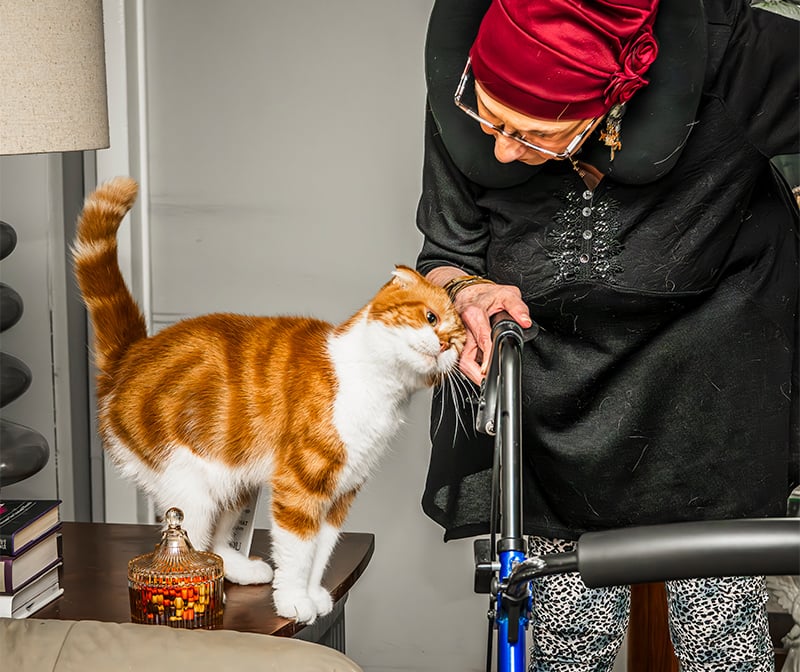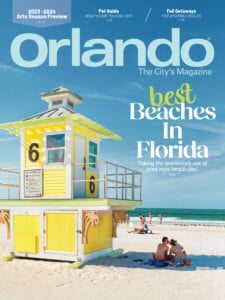Food & Drink: Food in the Time of Coronavirus
In praise of those who nourish us, fight the good fight, and look forward to a better day.

Christine Marcano of Cocina 214 in Winter Park heads curbside with a customer’s order (ROBERTO GONZALEZ)
Prophetically, the concept of ghost kitchens was the buzz of early 2020—restaurants that have no public space but operate via online ordering and delivery, growing from underground to a viable business model.
Skip to late March and early April, and all of Orlando became a ghost kitchen, the food scene a ghost town.
I’m going to trod on some rules of journalism here. First, journalists are supposed to be, expected to be, objective and impartial (quite a fanciful statement these days). It’s different with criticism. The best of us convey our experiences; how else can we say if one restaurant or chef or dish is better than another? And we’re definitely not supposed to get involved with our subjects.
So, I’m breaking those rules, because I care about this community of food people and some of them are my friends (who I continue to review when necessary, always objectively and truthfully, and they know that). I am involved in this scene not only as a reviewer and writer, but I’ve produced several dining experiences as part of my theater and jazz projects. So, I’ve heard about the pain of this New Society not only through news reports, but directly from those affected.
I’ve been writing about all things Orlando since 1997, and the growth of its culinary landscape has been extraordinary. When official word came down that all dining rooms were to be closed, you could almost hear the collective gasp. But I think it was because we have progressed and matured so far that owners and chefs were able to adapt and hold out as long as they did.
The coronavirus pandemic has hit writers along with their subjects. Everyone who has ever written about or photographed food has published a list of take-out options in Orlando, because, basically, we don’t have much else to write about. Those who are able to write about the economic impact to the community are doing much good in a bleak situation. But the parameters change almost hourly: In one day, proclamations went from half occupancy to pickup only to locked bars. Six-foot distancing became curfews, mandatory orders to stay at home and recommended mask-wearing, amid conflicting orders. Whether it’s pickup only, cutting hours or simply closing the doors, the options for chefs and owners have been painful.
Deeper in the agony have been line cooks, servers and staff of those restaurants. The term of the moment is “furlough,’’ but with staffs cut by 90 percent in some cases, the servers and bartenders who depend on tips, along with the kitchen help and hosts, are sitting in limbo hoping their meager savings will hold out, with no certainty any jobs will be available once this is over. One chef told me that she and her partner are subsisting on one meal a day that her employer provides, “but I’m sure they will only be able to do that for so long.” She spotted a man wearing a chef’s coat at an I-4 exit ramp with a sign that read “unemployed for the last 3 weeks and still waiting for unemployment.”
James Beard winner Melissa Kelly (Primo in Orlando and Maine) is seeing that situation up close. Normal staffing at the 150-seat Primo in Rockland, Maine, comprises eight cooks, two dishwashers, 12 servers, plus prep cooks, managers and three farmers. She has had to cut staff to the bone. With the Orlando location shut down (along with the entire Grande Lakes complex), Kelly has concentrated on keeping her flagship restaurant running—in a way. “It’s me and two cooks,” she says. “One on the phones, one running food to guests.” She has been assembling prepackaged meals for pickup. “I’m making about 150 meals a day right now.’’
Kelly admits it is a scary situation. “The loans to pay, the employees that depend on us … how can we plan? It’s day by day.” She does say that, at this point, an expansion and renovation of the Orlando restaurant that was intended for the fall is still in the works.
Others aren’t so fortunate. Rhys and Alexia Gawlak (Swine & Sons) informed me privately of upcoming plans for expansion and changes in their thriving but stressful business when we spoke at the beginning of March, plans that would be the culmination of a years-long dream. But Alexia told me later in the month, “We pulled out of the new project. Too much unknown.”
Maxine’s on Shine and the Se7en Bites/Sette family suspended their curbside and delivery services March 23, three days after shifting to the new model; Lee & Rick’s Oyster Bar closed that night. “This is the right decision if we want this to be over,” Se7en’s Trina Gregory-Propst told me. “And if I have to set an example, then so be it. This is serious and I need to be responsible.” They tried to reform pickup under stricter guidelines, but as Trina said on Facebook, “Our gut tells us this is not the right thing for us to do at this time.” Maxine’s has had occasional openings to make some of owner Kirt Earhart’s voluminous wine collection available for sale.
Diners accustomed to eating out as their main social activity have treated curbside pickup as an evangelical mission, or a new form of Pokémon Go—gotta hit them all.
Some businesses, like P Is For Pie, kept their dining room open longer than most, but eventually switched to pickup only. Their business, based on made-to-order pastry as well as counter service, has been doing well. “Our midweek sales are pretty good,” co-owner Ed Tomljenovich says. “And Saturdays, our busiest day, are holding on.” The bakery has sold out several times in recent weeks.
Redlight Redlight fell under the “bars and nightclubs closed for 30 days” restriction set up by the state on March 17, and immediately switched to a takeout model. Owner Brent Hernandez told me, “It’s like a never ending hurricane but we still have power. We’re getting by, barely, but still thankful for the support!” Once restaurants were ordered to lock their doors, pickup options were allowed to include alcohol sales, a primary source of profits in the margin-thin dining trade.
Meanwhile, restaurants like the recently opened Sixty Vines and The Porch were selling family packs, party packs and “quarantine kits” of meat and produce—basically paring down their larders while they could. Seito Sushi, Reyes Mezcaleria and Osprey Tavern, owned by Jason and Sue Chin, were offering “ready to cook” dinners along with grocery staples—milk, eggs, proteins and produce—from their supply, as was 4Rivers Smokehouse. On several occasions, the Chins teamed with José Andrés’ World Central Kitchen to provide meals for industry workers affected by COVID-19, while Greg Richie at Soco created similar opportunities. Reaching further into the community, John Rivers’ organization created Feed The Need Florida, aiming to distribute more than 1 million meals to families of students dependent on school-distributed meals (state meal programs are not allowed to provide food for other hungry family members).
Plants don’t stop growing because there are fewer places to sell the produce. Restaurants are trying to help the small farmers and suppliers that feed us. Chelsie Savage’s three restaurants, Proper and Wild, Sanctum and Sanctum Coffee & Juice Bar, moved to a “virtual famers’ market,’’ becoming pickup points for local growers Sugar Top Farms, Waterkist Farms and Frog Song Organics. Lake Meadow Naturals (whose chickens don’t care about a pandemic) has teamed with Winter Garden growers The Farmacy to sell their produce in the LM store. Dexter’s New Standard did the same with Waterkist. Olde Hearth Bread Company, already taking curbside pickup orders, offers flour and sugar at $1 a pound. On March 25, they became the last artisanal bread bakery in the area still operating. And in the ongoing evolution of this business, restaurants became mini remote food halls, with Tennessee Truffle in Sanford transforming into a hub for Olde Hearth, Lake Meadow and fish from Wild Ocean Seafood.
East End Market flipped the model, offering low-cost delivery directly to homes from several of the East End vendors like Domu, Hinckley’s Meats and Gideon’s Bakehouse. Their first offering on April 3 was a test of logistics. “It was an overwhelming success,” East End owner/founder John Rife told me, accentuating the overwhelming part. “We drove 95 miles between 60 deliveries, so we ended up with some delays.” Overall, “The tenants were thrilled. While it is certainly going to be profitable for them, I think the whole thing provided a sense of hope that we have one more oar in the water and can paddle, however slowly, to the end of this virus-induced slowdown.”
Venoy Rogers, executive chef at American Bar & Grill, is also struggling through this limbo. “I’m doing better than a lot of my compatriots,” he says. “But our dining room is closed. The pool bar has a small menu and we’re still feeding employees in the hotel’s cafeteria, but the hotel itself [B Resort & Spa] is down to about 10 percent occupancy. In fact, we started cutting services when management saw a substantial die down in reservations. All of the events we had scheduled were canceled for the rest of the year, and that was even before we knew how bad this really could get.”
Rogers says this pandemic is much different from the fast-hit disaster of a hurricane. “I’m normally an optimistic person, but we’re not going to just bounce back. It will take some time.” And then he brought up a chilling point. “Even if it ends relatively soon, we’re chewing up the end of the season; we’re going into what would be the slow season anyway.”
On the media front, Orlando Weekly, dependent on nightlife and restaurant advertising, laid off 13 people when owners Euclid Media Group slashed 80 percent of the workforce at its seven alternative weeklies nationwide. Without new restaurants to discover and dishes to photograph in painstaking detail, the food “bloggerverse” has been occupied with lists of restaurants delivering food, sharing kitchens and shutting doors. Here at Orlando magazine, we’ve postponed our Dining Awards issue, which normally runs in May, and along with it the ceremony for the winners. Two weeks after I launched my own dining project, “Pompeii’s Table,” at the Orlando Science Center (designed to support their touring exhibition, Pompeii: The Immortal City), every one of my participants in the Italian-themed series of experiences was either on the delivery-only model or closed for the duration. I aim to pick up the series again when the world recovers.
The past weeks have seen people doing their best to help themselves and benefit others, and much of it from this local community of good food folks: chefs and restaurant owners, servers and bartenders, farmers and writers and delivery people looking out for one another, trying to stay afloat so they are able to continue or reopen when this calamity is done. There will be restaurants that cannot weather the losses and storefronts that will remain dark in a business that normally expects a high rate of closures just as a matter of course.
Things happen behind the scenes, unselfish and heartening, that most of you will not hear about, that the doers of these things have privately said to me: “We don’t want this publicized; we simply want to help.’’ Forget the toilet paper hoarders and the brash snatchers of groceries. The fellow humans out here working on making another sandwich or gathering a box of mushrooms or bringing noodles out to your car are the ones who will help us through. They are the ones who nourish us, literally and spiritually, supporting themselves and one another in this time of social distancing. That is the story of this pandemic.
As chef Rogers says, “I’m hoping people will come back in when we get out the word that, hey, we’re still here.”




